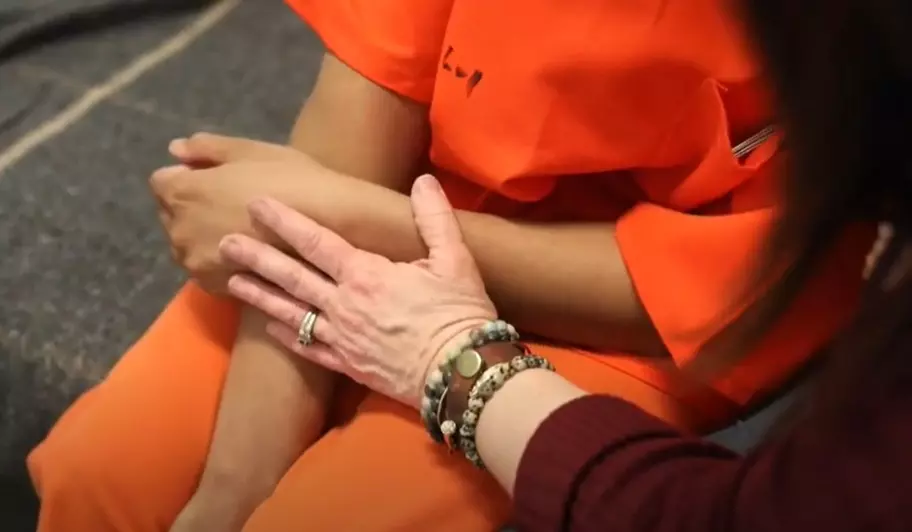A North Carolina pregnancy help organization (PHO) is deeply involved in rescuing women from human trafficking and those behind the ministry are passionate and are eager to collaborate with others in the pregnancy help movement to save women.
Cry Freedom Missions (CFM), a branch of Wayne Pregnancy Center in Goldsboro, N.C., is a non-profit that fights sex trafficking with the mission of “Reaching, Rescuing, and Restoring the lives of survivors.”
Beverly Weeks, CEO of CFM and executive director of Wayne Pregnancy Center, Jonathan Chavous, the pregnancy center’s COO, and their team have been involved in rescuing human trafficking victims for roughly five years. The effectiveness of the ministry has resulted in their being involved in law enforcement stings and assisting women in the justice system, while also providing training and consultation across the country.
Pregnancy help organizations have been serving survivors of human trafficking for some time, though it's not always widely known or advertised as centers have to stay under the radar to most safely serve victims.
Heartbeat International has trained hundreds of individuals representing pregnancy help organizations from across the globe on human trafficking in a variety of forums over the last few years. Heartbeat launched the first course on how to identify and assist trafficking victims specifically designed for pregnancy help organizations in 2018 through its on-line Academy.
The people behind Cry Freedom Missions also recognize that pregnancy centers are uniquely positioned and they are eager to see even more centers helping to fight the scourge of human trafficking.
“We feel like pregnancy centers all across the country should be on the forefront of being educated and even assisting women who are in human trafficking,” said Weeks, “because they're very well going to walk into your pregnancy centers for pregnancy tests, for ultrasounds, for resources. And so, we want other pregnancy centers to know what to look for.”
[Click here to subscribe to Pregnancy Help News!]
Speak up for those who cannot speak for themselves
Weeks and Chavous have given a lot of their time and they themselves have at times potentially been in harm’s way, but they are driven, saying their work is based upon Proverbs 31:8 - which exhorts the faithful to speak up for those who can’t do so for themselves.
“Our pregnancy center decided, look, the word of God told us to speak up for those who cannot speak for themselves, for the rights of all who are destitute,” Weeks said. “And so, we use that verse for every single pregnancy center client who walks in the door.”
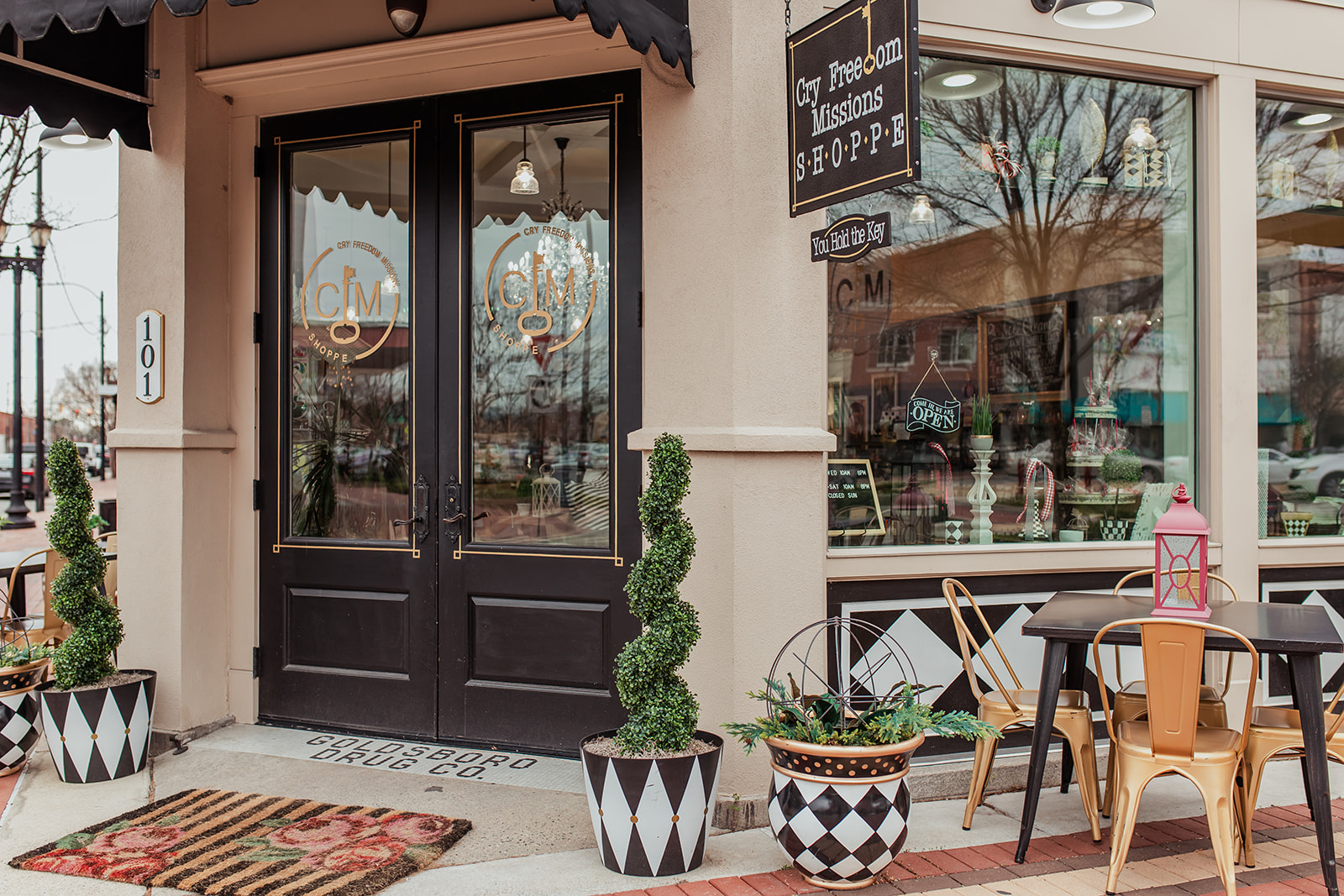
In addition to the Wayne Pregnancy Center, CFM has a safe house, and the Cry Freedom Missions Shoppe, a boutique in downtown Goldsboro, which funds the safe house, selling survivor-made jewelry, gifts, handbags, home decor and more.
The safe house is in an undisclosed location, and provides survivors with emergency housing, food, clothing, and other essentials before they then work with case managers to develop a long-term plan.


The pregnancy center identifies and serves around two survivors per week on average.
After a survivor is placed in the emergency safe house, which is for 30 days or less, the case management team is brought in to provide trauma counseling, life skills, medical and dental services, rehab, and a long-term plan of action is then established for safe housing and additional rehab services.
The process for a survivor to reenter society can take two to three years, Weeks said, and even when survivors have completed the CFM program, they are offered survivor retreats twice a year. CFM also works with survivors on employment and job placement. CFM has opened a satellite office in Sanford, N.C. and is looking to open additional satellite offices across the state elsewhere in the U.S.
First sign of red flags
It was around five years ago when Weeks first noticed a group of women coming into the pregnancy center for pregnancy tests. They would never have an ID with them. Some would look malnourished, and it was evident that some of them were active drug users, recognizable because the center had taken training to educate staff on drug use and addiction.
“I could tell because of the training that I had received,” Weeks said. “A lot of them had meth sores on them, or I could see the needle tracks on their arms.”
In addition to the drug use signs, occasionally the women would come in with one of two men, and they would have to look at the man to answer the questions that center staff were asking them in the counseling rooms. Further when asked where they lived during intake sessions the women couldn’t give an address.
“All of these were flags for me,” Weeks said. “I thought it was very unusual that somebody could not even tell you where they live, or they were staying in a hotel.”
Weeks gave a client a ride home to her hotel to find the woman surrounded in the room by a group of men. She would develop a relationship with the young woman and, noticing that the woman never carried a pocketbook, she would come to learn that it had been taken away. Traffickers will take them and the girls’ IDs to make victims dependent on them for food and lodging, Weeks said, and in this case, she noticed there were several other rooms with more girls.
We’re going to do something
This drove Weeks to consult with her team at Wayne Pregnancy Center on how to serve these women and resulted in them taking pregnancy tests and mobile ultrasound to the hotel. One woman they served was 38 weeks pregnant and had had no prenatal care.
“So, Jonathan and I got together and decided that, while we were hearing a lot in the community on human trafficking, what to look for - and we think that education is key - but he and I were in a community meeting, and we decided we were going to stop just talking about it,” Weeks said.

The hotel outreach, performed on a weekly basis, was the first step. This included a case manager and a peer support specialist as part of a whole pregnancy help team.
They would perform free pregnancy tests, help the women get STD screenings and other resources, and perform ultrasounds. They would take the women food, pocketbooks, clothing, diapers, and wipes.
“All the resources that we would have available to a client at the pregnancy center, “Weeks told Pregnancy Help News. “We decided to take those resources out into the community.”
The pregnancy center’s teams have received training from the State Bureau of Investigation and taken part in in trainings with the FBI, Weeks said, and they also participated in trainings with their local authorities on a weekly basis.
They now go across the state of North Carolina weekly in different hotel situations and outreaches.
We want God's very best for them
The center’s outreach had involved speaking to school children about abstinence, and now includes human trafficking and the dangers of social media.
This component came about after the Cry Freedom team members asked themselves who would be targeted most for being violated sexually
“We felt like, we were talking about sexual abstinence and sexual health for children for teenagers,” said Weeks. “And we realized this is a vulnerable group of women. Don't we want sexual health for them too? Don't we want God's very best for them?”
“Who's actually reaching out to the most broken people in our society” Chavous asked. “The people that are being abused beyond our understanding? We want these women to be free of the abuse and horror in sex trafficking.”
Tweet This: We want these women to be free of the abuse and horror in sex trafficking.
From the hotel outreach they were doing they also noticed that the same women - and also young boys who are being trafficked or in prostitution - were ending up in jail. 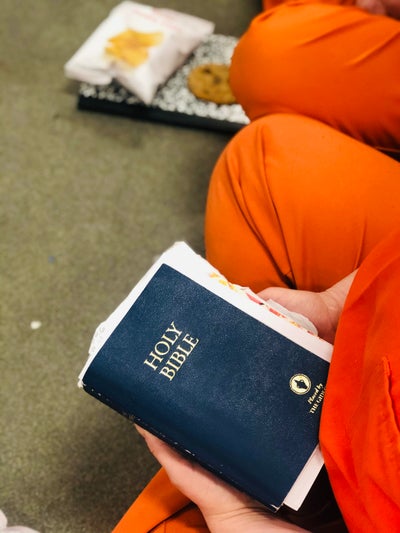
This led to the jail outreach, which Weeks said was an ideal opportunity to get a woman away from her pimp or drug dealer and continue the relationship with her on an even deeper level.
“So, we went to our local authorities and our court system,” she said. “And we said, let us bring the classes that the pregnancy center is teaching inside of our pregnancy center, the life skill classes, the parenting classes, the job skill readiness classes, let us bring those classes inside the jail system that will give us an opportunity to get these girls away from their pimp and their drug dealer and extend that conversation.”
A tie to abortion and drugs
This outreach was also eye opening.
Of some 400 intakes performed with incarcerated women the center’s first year of jail ministry, 92% of those women had had an abortion.
“What we found was shocking statistics over 90% of the women that were incarcerated in the jail had had an abortion in their past,” said Weeks, “over 90%.”
Abortion healing was added to the jail outreach.
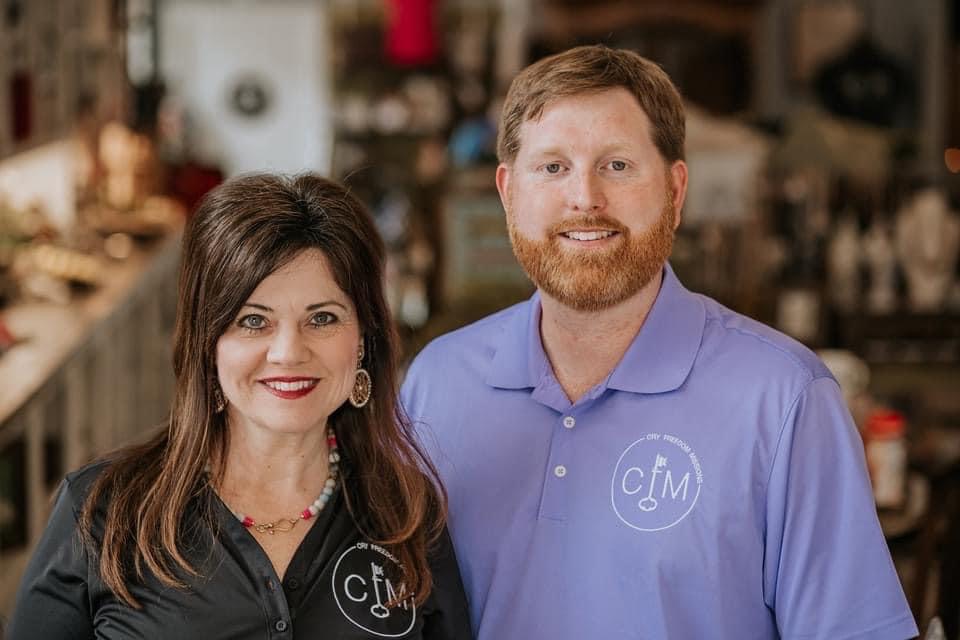
Weeks and Chavous told the others at that community meeting that they were going to start performing the hotel ministry, along with jail ministry, and open the center up as a place of refuge and safety, which led to the development of Cry Freedom Missions, and to their receiving training with the FBI, the SBI, other authorities and human trafficking organizations.
While partnering with other organizations and rescuing women, it became clear there was a need to have a place for them to go.
Cry Freedom Missions opened a 12-bed emergency safe house last year that provides care 24 hours a day.
It was in the heart of God to do this
The safe house came about in a way that showed God’s providence.
While creating a five-year plan to pay for building a safe house on donated land, a property that already a safe house built on it became available after the non-profit behind it did not get off the ground.
CFM was among a group of non-profits invited to apply to be the recipient of the donated to property and was ultimately chosen.
“So, you talk about a hand and the move of God,” Weeks said. “It was very evident that we were getting affirmation from God that this was where He was leading our pregnancy center.”
“I can say without a shadow of a doubt, it obviously was in the heart of God to do it,” Chavous told Pregnancy Help News of the CFM human trafficking outreach. “Because when we stepped out to do this, just divine appointment after divine appointment happened, of people giving, of resources coming in, we were given a safe house.”
The group has been part of human trafficking stings statewide.
“What we would do is we would go in and love on the girls, tell them, ‘Listen, there's other options for you,’” Weeks said. “‘You know, we're here to care about you. We're not here to force you to make any decision, but we want you to know there's, there's safe places for you to go.’”

product for the mission's boutique
The CFM safe house is geared for a short-term solution. The team works to move clients into long-term housing and Christian rehab after their time with CFM. The outreach has been so successful that judges and prosecutors in the justice system have released women early to go through CFM’s safe house and program.
Human trafficking 101
The CFM team has learned a lot in traveling across the state and the country, talking to other pregnancy centers, Weeks told Pregnancy Help News. Part of what they saw is that some centers did not know what human trafficking is or had misconceptions.
“I think it's very key to explain that human trafficking doesn’t mean you have to transport someone from one area to another area,” she said. “So, I think it's very important to educate pregnancy centers on exactly what human trafficking is.”
“And right now, human trafficking is $150 billion industry,” Weeks stated. “It's second only to drugs.”
“You can sell a bag of drugs, just one time,” said Weeks, “but you can sell a young girl or a young guy over and over and over again. And these transactions are not just taking place overseas somewhere, they're taking place right here in our own neighborhoods.”
There are three elements according to federal law that comprise human trafficking, Chavous explained. Human trafficking occurs when anybody 18 or older has been sexually exploited or compelled to work, by force, coercion, or fraud.
Another little-known and alarming statistic they learned was that less than 10% of all trafficking takes place by a stranger.
“Ninety percent of people who are in human trafficking are being trafficked by somebody they know,” said Weeks, “by a boyfriend, by an employer, somebody they met on social media, immediate family, friends - that was extremely shocking to us.”
Another aspect is drug addiction.
“We were finding out that people who have been actively addicted to a drug for at least two years, that over 90% of them had been sexually exploited in some way,” she said.
You have value. We love you.

Many of the trafficking survivors they serve work at the CFM Boutique and/or make jewelry for the boutique as a means of moving toward self-sufficiency.
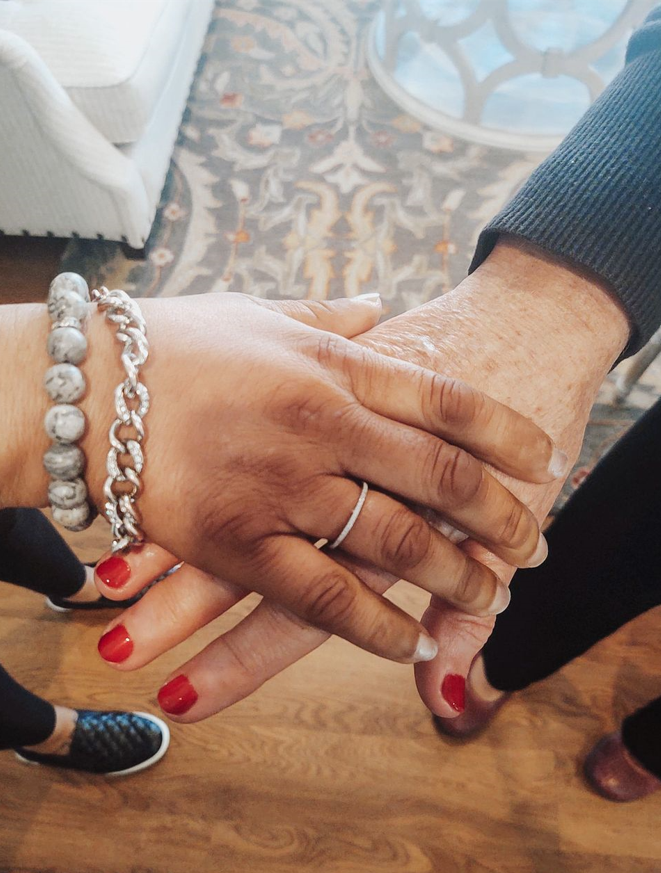
model products from the boutique
The message with this and the trauma counseling provided, Weeks said, is, “We value you. We love you. You have value - because that was the opposite of what the traffickers was telling them.”
The boutique is an integral part of how they sustain the ministry, Chavous said, and also how they get the message out.
“It is elevating the message that we want to see slavery ended in our generation,” he said. “And that we at Cry Freedom Missions are here to see the broken restored. We're here to reach the survivors of human trafficking, so they know that we want to be able to rescue them, and we want to see them completely restored.”
Tweet This: We are here to see the broken restored, to reach the survivors of human trafficking, so they know that we want to be able to rescue them.
Weeks, Chavous and their team are eager to continue sharing what they do and educating on human trafficking, connecting centers, churches and anyone interested in fighting for the freedom and restoration of trafficking victims. They are available for consultation, speaking and training.
For more information about the Cry Freedom Missions human trafficking outreach, click HERE.



